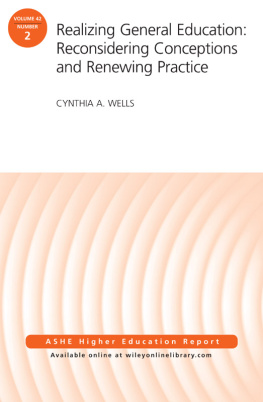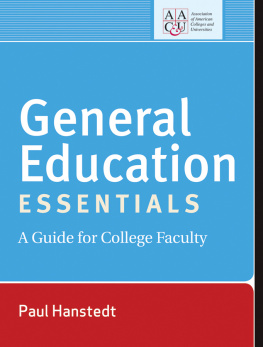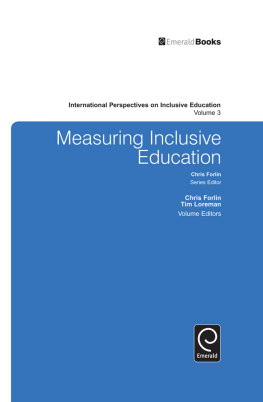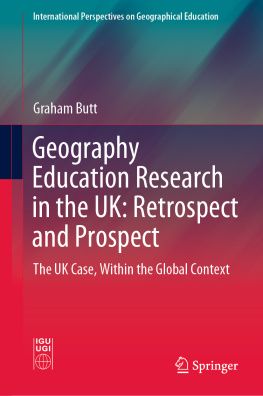
Realizing General Education: Reconsidering Conceptions and Renewing Practice
Cynthia A. Wells
ASHE Higher Education Report: Volume 42, Number 2
Kelly Ward, Lisa E. WolfWendel, Series Editors
Copyright 2016 Wiley Periodicals, Inc., A Wiley Company. All rights reserved. Reproduction or translation of any part of this work beyond that permitted by Section 107 or 108 of the 1976 United States Copyright Act without permission of the copyright owner is unlawful. Requests for permission or further information should be addressed to the Permissions Department, c/o John Wiley & Sons, Inc., 111 River St., Hoboken, NJ 07030; (201) 7488789, fax (201) 7486326, www.wiley.com/go/permissions.
Cover image by iStock.com/rusm
ISSN 15516970 electronic ISSN 15546306 ISBN 9781119244653
The ASHE Higher Education Report is part of the JosseyBass Higher and Adult Education Series and is published six times a year by Wiley Subscription Services, Inc., A Wiley Company, at JosseyBass, One Montgomery Street, Suite 1200, San Francisco, California 941044594.
Individual subscription rate (in USD): $174 per year US/Can/Mex, $210 rest of world; institutional subscription rate: $352 US, $412 Can/Mex, $463 rest of world. Single copy rate: $29. Electronic onlyall regions: $174 individual, $352 institutional; Print & ElectronicUS: $192 individual, $423 institutional; Print & ElectronicCanada/Mexico: $192 individual, $483 institutional; Print & ElectronicRest of World: $228 individual, $534 institutional.
CALL FOR PROPOSALS: Prospective authors are strongly encouraged to contact Kelly Ward ().
Visit the JosseyBass Web site at www.josseybass.com.
The ASHE Higher Education Report is indexed in CIJE: Current Index to Journals in Education (ERIC), Education Index/Abstracts (H.W. Wilson), ERIC Database (Education Resources Information Center), Higher Education Abstracts (Claremont Graduate University), IBR & IBZ: International Bibliographies of Periodical Literature (K.G. Saur), and Resources in Education (ERIC).
Advisory Board

The ASHE Higher Education Report Series is sponsored by the Association for the Study of Higher Education (ASHE), which provides an editorial advisory board of ASHE members.
- Amy Bergerson
University of Utah - Bryan Brayboy
Arizona State University - Ryan Gildersleeve
University of Denver - Michael Harris
Southern Methodist University - Elizabeth Jones
Holy Family University - Adrianna Kezar
University of Southern California - Kevin Kinser
SUNY Albany - Peter Magolda
Miami University of Ohio - Dina C. Maramba
SUNY Binghamton - Susan Marine
Merrimack College - Christopher Morphew
University of Iowa - Robert Palmer
SUNY Binghamton - Michael Paulsen
University of Iowa - Todd Ream
Taylor University - Barbara Tobolowsky
University of Texas at Arlington - Carolyn Thompson
University of Missouri, Kansas City - Diane Wright
Florida Atlantic University
Executive Summary
General education is frequently heralded as distinctive to U.S. higher education. Colleges and universities tout the value of a general education in their mission statements and catalogues. The importance placed on a general education in the context of U.S. higher education bears out in that approximately one third of the typically 120 credits for the bachelor's degree in the United States consist of general education requirements (Lattuca & Stark, 2014). General education also has a long and contested history; moreover, it has experienced multiple periods of renewal over the course of that history (Boyer & Levine, 1981; Trowbridge, 1958). Greater comprehension of this muddled history and its imprint on varied philosophical and programmatic ideals in the present are vital to realizing the aims of general education.
Our Varied Conceptions of General Education
In spite of seeming reverence for general education, there is little consensus as to what we actually mean by general education. Some argue that general education is about introducing specific subjects, whereas others point out that college graduates should share certain fundamental skills. Still another viewpoint is that essential texts are requisite to a general education. Differing perspectives not only make it challenging to consider the significance of general education but also open it up to a wide range of determinations regarding its effectiveness.
Beyond disagreement, general education is both resisted and resented in the current context. Questions are frequently raised about the point of general education, particularly but not exclusively among parents and students. General education is often considered something to get out of the way rather than a worthy end in and of itself or even a means to enriching the experience of earning the undergraduate degree.
General education is also implicated in much of the broader criticism facing higher education. Critique revolves around the lack of attention to questions of meaning (Kronman, 2007). General education is at the center of critique regarding the quality of student learning (Arum & Roksa, 2011; Donoghue, 2008; Keeling & Hersh, 2012). Concerns have also been voiced about fragmentation within the educational experience as well as disconnect between the academy and the societal context (Taylor, 2010). Revitalizing general education is often positioned as a means to addressing these concerns.
Our conceptions of and aspirations for general education are consequential in advancing the effective preparation of college and university graduates in the twentyfirst century. General education raises important queries of individual and social significance and influences how we respond to appeals for accountability, including the affordability and value of higher education.
This monograph is grounded in the premise that general education indeed matters but that divergent and largely implicit conceptions limit our ability to effectively navigate general education. While achieving consensus on the ideals of a general education is too lofty a goal, disentangling the divergent conceptions that hinder renewal and advancing a broader frame for comprehension are vital steps toward realizing the aims of a general education.
My contention is that general education represents a way of framing the notion that there is something valuable about an education that empowers individuals and gets at something larger than any single academic discipline. This conception is intentionally expansive, reflecting the fact that general education involves a variety of outcomes that can be achieved in different contexts and through a number of educational strategies. General education prescribes particular lenses for curriculum and educational practice while simultaneously encompassing a wide number of ideals, models, and programs.
Various conceptions of general education evolved over the course of the complex history of higher education in the United States. This monograph surveys this history, emphasizing the connection between general education and broader social and educational dynamics. By understanding the wide range of ideals espoused for general education and how they emerged over the past three hundred years, educational leaders will be better prepared to navigate the complexity of the present.
Next page







